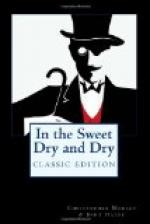Bleak poured himself a glass, and watched his host carefully resume the hoary wig and whiskers. They passed into the garden, a quiet green enclosure surrounded by brick walls and bright with hollyhocks and other flowers. It was overlooked by a quaint jumble of rear gables, tall chimneys and white-shuttered dormer windows.
“Do you play croquet?” asked Quimbleton, showing a neat pattern of white hoops fixed in the shaven turf. “If so, we must have a game after supper. It’s very agreeable as a quiet relaxation.”
Mr. Bleak was still trying to get his bearings. To see this robust creature gravely counterfeiting the posture of extreme old age was almost too much for his gravity. There was a bizarre absurdity in the solemn way Quimbleton beamed out from his frosty and fraudulent shrubbery. Something in the air of the garden, also, seemed to push Bleak toward laughter. He had that sensation which we have all experienced—an unaccountable desire to roar with mirth, for no very definite cause. He bit his lip, and sought rigorously for decorum.
“Upon my soul,” he said, “This is the most fragrant garden I ever smelt. What is that delicious odor in the air, that faint perfume—?”
“That subtle sweetness?” said Quimbleton, with unexpected drollery.
“Exactly,” said Bleak. “That abounding and pervasive aroma—”
“That delicate bouquet—?”
“Quite so, that breath of myrrh—”
“That balmy exhalation—?”
Bleak wondered if this was a game. He tried valiantly to continue. “Precisely,” he said, “That quintessence of—”
He could coerce himself no longer, and burst into a yell of laughter.
“Hush!” said Quimbleton, nervously. “Some one may be watching us. But the fragrance of the garden is something I am rather proud of. You see, I water the flowers with champagne.”
“With champagne!” echoed Bleak. “Good heavens, man, you’ll get penal servitude.”
“Nonsense!” said Quimbleton. “The Eighteenth Amendment says that intoxicating liquors may not be manufactured, sold or transported for beverage purposes. Nothing is said about using them to irrigate the garden. I have a friend who makes this champagne himself and gives me some of it for my rose-beds. If you spray the flowers with it, and then walk round and inhale them, you get quite a genial reaction. I do it principally to annoy Bishop Chuff. You see, he lives next door.”
“Bishop Chuff of the Pan-Antis?”
“Yes,” said Quimbleton—“but don’t shout! His garden adjoins this. He has a periscope that overlooks my quarters. That’s why I have to wear this disguise in the garden. I think he’s getting a bit suspicious. I manage to cause him a good deal of suffering with the fizz fumes from my garden. Jolly idea, isn’t it?”
Bleak was aghast at the temerity of the man. Bishop Chuff, the fanatical leader of the Anti-Everything League—jocosely known as the Pan-Antis—was the most feared man in America. It was he whose untiring organization had forced prohibition through the legislatures of forty States—had closed the golf links on Sundays—had made it a misdemeanor to be found laughing in public. And here was this daring Quimbleton, living at the very sill of the lion’s den.




